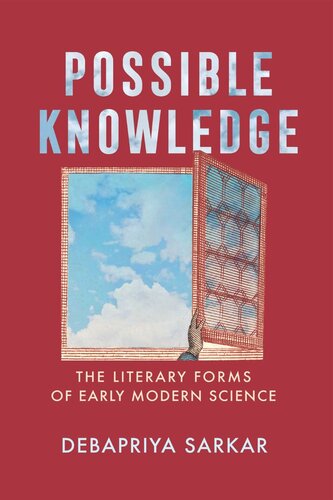

Most ebook files are in PDF format, so you can easily read them using various software such as Foxit Reader or directly on the Google Chrome browser.
Some ebook files are released by publishers in other formats such as .awz, .mobi, .epub, .fb2, etc. You may need to install specific software to read these formats on mobile/PC, such as Calibre.
Please read the tutorial at this link: https://ebookbell.com/faq
We offer FREE conversion to the popular formats you request; however, this may take some time. Therefore, right after payment, please email us, and we will try to provide the service as quickly as possible.
For some exceptional file formats or broken links (if any), please refrain from opening any disputes. Instead, email us first, and we will try to assist within a maximum of 6 hours.
EbookBell Team

0.0
0 reviewsExploring the imaginative habits of thought of early modern thinkers—including Shakespeare, Milton, Sidney, Bacon, Spenser, and Cavendish—Possible Knowledge enacts a history of ideas that centers literary studies and suggests that what we term a history of science might ultimately be a history of the imagination.
The Renaissance, scholars have long argued, was a period beset by the loss of philosophical certainty. In Possible Knowledge, Debapriya Sarkar argues for the pivotal role of literature—what early moderns termed poesie—in the dynamic intellectual culture of this era of profound incertitude. Revealing how problems of epistemology are inextricable from questions of literary form, Sarkar offers a defense of poiesis, or literary making, as a vital philosophical endeavor.
Working across a range of genres, Sarkar theorizes “possible knowledge” as an intellectual paradigm crafted in and through literary form. Sixteenth- and seventeenth-century writers such as Spenser, Bacon, Shakespeare, Cavendish, and Milton marshalled the capacious concept of the “possible,” defined by Philip Sidney as what “may be and should be,” to construct new theories of physical and metaphysical reality. These early modern thinkers mobilized the imaginative habits of thought constitutive to major genres of literary writing—including epic, tragedy, romance, lyric, and utopia—in order to produce knowledge divorced from historical truth and empirical fact by envisioning states of being untethered from “nature” or reality.
Approaching imaginative modes such as hypothesis, conjecture, prediction, and counterfactuals as instruments of possible knowledge, Sarkar exposes how the speculative allure of the “possible” lurks within scientific experiment, induction, and theories of probability. In showing how early modern literary writing sought to grapple with the challenge of forging knowledge in an uncertain, perhaps even incomprehensible world, Possible Knowledge also highlights its most audacious intellectual ambition: its claim that while natural philosophy, or what we today term science, might explain the physical world, literature could remake reality. Enacting a history of ideas that centers literary studies, Possible Knowledge suggests that what we have termed a history of science might ultimately be a history of the imagination.